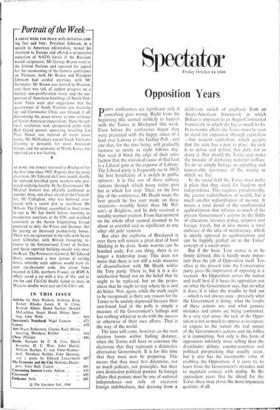Opposition Years
nARTY conferences are significant only if r something goes wrong. Right from the beginning this seemed unlikely to happen with the Tories at Blackpool this week. Even before the conference began they were presented with the happy omen of a lead over Labour in the Grallup Poll—and one that, for the time being, will gradually increase as surely as night follows day. Nor need it blunt the edge of their satis- faction that the statistical cause of that lead is a Liberal gain at the expense of Labour. The Liberal party is frequently (as in 1962) the first beneficiary of a switch in public opinion: it is like one of those railway stations through which many trains pass but at which few stop. Then, on the first day of the conference, Mr Heath made the best speech he has ever made on these occasions—notably better than Mr Wil- son's at Brighton, and he duly received a notably warmer ovation. From that moment on the whole affair seemed doomed to be about as eventful and as significant as any other old pals' reunion. But after the euphoria of Blackpool is over there will remain a great deal of hard thinking to be done. Some worries can be brushed aside. For one thing, there is no longer a leadership issue. This does not mean that there is not still a wide measure of dissatisfaction with Mr Heath within the Tory party. There is; but it is a dis- satisfaction based not on the belief that he ought to be replaced, but on the propo- sition that he ought to stay where he is and do better. Nor, again, while the truth ought to be recognised, is there any reason for the Tories to be unduly depressed because their new-found lead in the polls is simply a measure of the Government's failings and has nothing whatever to do with the success or otherwise of their own efforts. That is the way of the world. The time will come, however, as the next election looms within hailing distance, when the Tories will have to convince the electorate that they represent a distinctive alternative Government. It is for this time that they must now be preparing. This means that they must first determine, not so much policies, nor principles, but their own distinctive political posture. In foreign affairs that posture must be one of national independence—not only of excessive foreign indebtedness, but deriving from a deliberate switch of emphasis from an Anglo-American framework in which Britain is impotent to an Anglo-Continental framework in which she has so much to do. In economic affairs the Tories must be seen to stand for expansion through capitalism —but modern capitalism, which accepts that the state has a part to play: the task is to define and delimit that part, not to decry it. Nor should the Tories ever make the mistake of deploring material welfare. To do so simply betrays an appalling and inexcusable ignorance of the society in which we live.
In the social field the Tories must make it plain that they stand for freedom and independence. This requires, paradoxically, the greater redistribution of wealth, but a much smaller redistribution of income. It means a total denial of the small-minded egalitarianism that informs so much of the present Government's actions in the fields of education, incomes policy, taxation and foreign travel, but it also means a total embrace of the idea of meritocracy, which is utterly opposed to egalitarianism and can be happily grafted on to the Tories' concept of a social order.
But if the basic Tory stance is to be firmly defined, this is hardly more impor- tant than the job of Opposition itself. Too often at the present time the Conservative party gives the impression of opposing in a vacuum. An Opposition serves the nation and itself best if it bases its opposition not on what the Government says, but on what it does; if it takes the trouble to find out —which is not always easy—precisely what the Government is doing. what the results of these actions are, and what genuine mistakes and errors are being committed. In a very real sense, the task of the Oppo- sition is not so much to oppose as to expose, to expose to the nation the real nature of the Government's actions and the follies it is committing. Not only is this form of opposition infinitely more telling than the doctrinaire debate, counter-assertion and political pin-pricking that usually occur, but it also has the inestimable value of enabling the Opposition, if it cares to, to learn from the Government's mistakes and to maintain contact with reality. In the opposition years that lie ahead for the Tories these may prove the most important qualities of all.






































 Previous page
Previous page